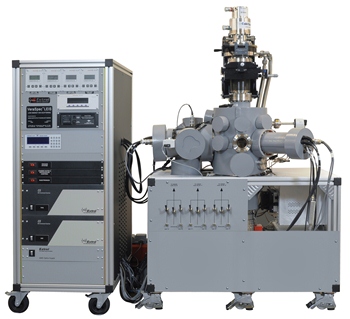Dr. T. Pradeep, noted professor and scientist based at the Indian Institute for Science and Technology (IIT) has taken receipt of an Ultra-Low Energy Ion Scattering system from Extrel CMS, LLC. The VeraSpec LEIS (Low Energy Ion Scattering) system has capabilities for mass and energy selected deposition at temperatures down to 10 Kelvin, ion scattering and secondary ion monitoring experiments, infrared and Raman spectroscopy, and temperature programmed desorption.
The system was designed with close cooperation between IIT and Extrel, and combines the experimental expertise of Dr. Pradeep's research group, and Extrel's high performance mass spectrometer systems and vacuum design experience. Extrel delivers Ultra-Low Energy Ion Scattering Spectrometer system to Indian Institute for Technology.o
Extrel delivers Ultra-Low Energy Ion Scattering Spectrometer system to Indian Institute for Technology.o
The Pradeep research Group at IIT Madras is involved with the discovery and application of novel materials. Most often the constituents of these materials are 'nano' objects. The group explores the possibility of discovering novel physical and chemical properties of these objects. The delivery of the VeraSpec LEIS to one of the most state-of-the-art centers for chemical research extends the group's ability to study surface chemistry. Dr. Pradeep describes the key elements of their research this way:
"While molecular liquids and gases have been investigated extensively throughout the history of science, very little is known about the science, especially chemistry, of their solid state analogues. These solids in various forms are present throughout the universe and processes on them have relevance to interstellar chemistry, atmospheric processes of several planets, astrobiology, etc. These studies are also relevant from the perspective of molecular chemistry and physics. Low energy ion scattering (LEIS) is an important experimental tool to investigate events at the very top of molecular surfaces. Unlike photons and electrons, ions at low energies interact only with the top chemical bond. The energy of the ion is close to chemical bond energies and that makes it possible to observe chemically relevant processes.This makes LEIS a unique tool. In our experiment, diverse molecular solids grown on metal single crystals at cryogenic temperatures will be collided with mass and energy selected ions. The energy regime is the order of a few eV and the scattered and product ions will be mass analyzed. The surfaces could be stimulated with ultraviolet photons. The surface in transition itself will be probed with reflection absorption infrared spectroscopy, high energy secondary ion mass spectrometry,thermal desorption spectroscopy and Raman spectroscopy. All of these have to be done at extremely clean vacuum as the surfaces should not be altered at the very top.
Our studies will yield complete understanding of ion induced chemical processes occurring at the top surfaces of molecular solids. The results will give an in-depth view of chemistry at the inaccessible molecular soup present in the interstellar space, besides providing a fundamental understanding of a branch of materials hitherto unexplored."
Extrel CMS, LLC is a premier supplier of quadrupole mass spectrometer systems and components for Research and Industry. The VeraSpec product line encompasses Extrel's best mass spectrometer technology incorporated into systems for Research applications. The VeraSpec LEIS is an example of a collaborative design effort to create a unique system for a specific set of Research capabilities based around ion optics and mass spectrometer expertise. T. Pradeep: "Extrel is an organization which integrates the scientist's quest for the unknown with ultimate molecular probes - the ions."
Extrel's long history of providing the best mass spectrometer technology and working closely with customers allows Extrel to provide highly effective tools for research. T. Pradeep: "For me, Extrel has been with me in my path to explore the unknown. It is long years of faith in technology nurtured by the commitment of several people. I found it a true friend."
For more information on Extrel CMS, LLC visit www.extrel.com.